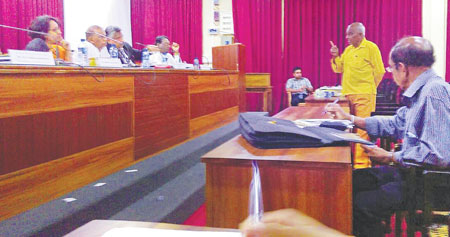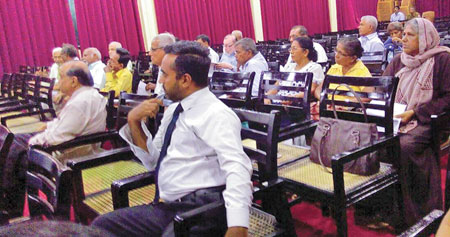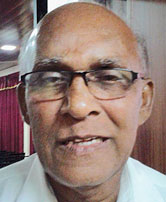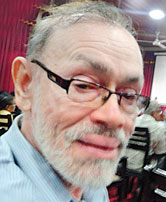A Day in the Life of constitution-making
From Sri Lanka's identity to politics, religion and
education, citizens of Gampaha have their say:
by Dhaneshi Yatawara
 |
| |
 |
|
Public waiting for their
turn to express their views
(Pix: Rights Now Collective for Democracy) |
On the lawn and in the shade of trees in the sunlit compound, people
waited to transact whatever dealings they had come for with the local
bureaucracy. It was a typical busy Monday mid-morning at the Gampaha
District Secretariat and most of the local citizenry seemed unaware of
the historic proceedings taking place inside the oldish, colonial-style,
Secretariat building, an event that would touch all of their lives as
citizens once the constitution-in-the-making became the supreme 'basic
law' of the Republic.
In the air-conditioned comfort of the Secretariat auditorium, the
Public Representations Committee of the Constitutional Reforms
Secretariat was conducting its public hearing for the Gampaha District.
The District Secretariat is located on the Colombo Road near Mirisvatta
on the outskirts of Gampaha.
Seven members of the 20-member Committee sat a table on-stage while
those attending the hearing sat in the hall waiting to make their
submissions for inclusion in the future constitution. On being called,
they would approach the stage and sit at the table at its foot.
Microphones were placed at the table helpfully so that all could hear
the submissions.
 |
M.G. Senagama,
Chairman,
Sri Lanka Education Administrative Service Union |
 |
S. Ranatunga,
President, Rationalist Association of
Sri Lanka |
The Committee had informed the public that translators were available
to help in both Sinhala or Tamil for those who needed it. The entire
hearing was, however, conducted in Sinhala with several Muslims who
attended being content to make their submissions in that language. The
attendant citizens included both individuals as well as representatives
of civic organisations of various types.
It is yet early days in the constitution-making process and by the
time the Public Representations Committee left Colombo and began moving
out to the provinces, the Committee had received over 180 proposals from
individuals and civic organisations. Gampaha seemed to have its own set
of lobbies and interest groups keen to join in the national public
conversation on our proposed new basic law.
Set of lobbies
On the first day in Gampaha there were over 30 oral submissions made
during the sittings held from morning till 5.30 p.m. in the evening.
These long hours were vibrant ones with numerous and varied proposals
and suggestions being contributed by the attendant citizens, all keen to
do their bit for their nation.
The submissions by the attendees, mostly middle-aged and elderly
citizens, focused on the long-acknowledged critical national issues such
as abolishing the executive presidency, education reforms, ethnic
identity, language issues, rule of law and administrative structures.
The Sunday Observer spoke briefly with several people after they had
made their formal submissions to the Committee.
A few raised the need to secure the identity of Sinhala-Buddhist
nationhood. Several, however, had different views, arguing before the
committee that the constitution and the government should not directly
be responsible to protect and nourish any specific religion. "A religion
should be strong enough to protect itself," seemed to be the argument
articulated by many.
M.M. Ismail from Malwana argued, unusually, that the official name of
the country should be changed to become the "Buddhist Multi-religous
Democratic Socialist Republic of Sri Lanka". He insisted that the
constitution should not be seen as part of the actual governmental
mechanism but as an overall framework that governs the whole national
community.
"The religious texts are written in Pali for Buddhists and in Arabic
for Muslims. But none of these languages are taught in schools.
Therefore it is advisable to include these two languages in the
curriculum and include it in the constitution. "It should be a rule of
law for the education sector to follow," he added, while outlining his
list of suggestions.
Ratnasiri Fernando, a retired Grama Niladhari, elaborated on dual
citizenship and the demarcation of areas of responsibility of Grama
Niladharis. "The clause in the existing constitution stating that a
person with dual citizenship cannot stand for the presidency is unfair.
A Sri Lankan-born person holding citizenship of another country should
not be excluded from holding public office if that person is most
suitable," he argued.
No equity
Further explaining his proposals regarding the Grama Niladari (GN)
structure, he said the new constitution should stipulate a structure
that ensures an approximate equal number of families in each GN Division
that are similar in extent of area. When questioned by the Committee on
locations where there could be less number of people in a similar land
area, he pointed out that such cases are a few in Sri Lanka and
therefore suggested adherence to the number of people per local
government unit. "Otherwise there seems to be no equity," he added.
Interestingly, Fernando as well as many other attendees who appeared
before the Committee, suggested that the future constitution should
include a clause to restrict the cross overs of politicians in
Parliament. "The politician concerned, if he or she is a minister at any
level, must resign from that ministerial post and the constitution must
include a clause to say that the ministerial post will be abolished
within 24 hours after the cross-over of the politician to another
party," he added.
"People who voted for such a politician considered the party he or
she was originally with at the time of contesting. A cross-over, whether
it is done genuinely or otherwise, is a clear violation of the people's
verdict. If the politicians genuinely cross over on a policy basis, then
they should be ready to take the risk," he added.
Many people making submissions insisted that a separate clause should
be included to protect the right to life.
In the list of suggestions presented by Sapumal Senanayake, an
ex-Navy serviceman and the co-convener for the Democratic Party branch
in the Attanagalla electorate, was a recommendation that Sri Lanka be
formally described as a Buddhist country in order to protect the
country's identity within the region considering the regional and global
cultural transformations occurring. "Many regional countries are
Buddhist. And it is already predicted China, which is largely a Buddhist
country, will be the next world power. It is advisable for Sri Lanka to
be within this niche to protect the country and sustain its
development," he explained adding that the new constitution should also
guarantee the rights of other ethnicities and religions.
At the same time, however, a number of attendees submitted to the
Committee that citizens should not be formally identified by religion or
ethnicity. "We all should be Sri Lankans," they emphasised. Elaborating
this point of view, S. Ranatunga, a retired auditor and the president of
the Rationalist Association of Sri Lanka, said the constitution needed
to be formulated without the involvement of any religion. "A religion
does not need protection from the government," he added.
Second chamber
In making his submissions, Ranatunga added that there should be a
segment within the legislature for the educated, intellectual
professionals to enter politics and suggested a 'second chamber'. When
questioned by the Committee about the existing national list mechanism
which is meant to bring in such intellectuals to the Parliament,
Ranatunga explained that it was already misused by politicians to bring
back to Parliament those defeated, rejected and corrupt politicians.
This mechanism's validity was lost due to this.
Sirinimal Lakdusinghe, an expert who served in the Department of
Archaeology and Central Cultural Fund and is the present chair of the
local Siyane Sanskruthika Sansadaya said the 13th Amendment to the
Constitution needs to be implemented with more devolution.
"The government should be bold enough to devolve police and land
powers to the North and East Provinces," he said.
He also insisted the government needed distance from any religion so
as the governance became free of the influence of religion.
Chairman of the Sri Lanka Education Administrative Service Union (SLEASU),
M.G. Senagama, said education should not be divided in to Sinhala and
Tamil language streams. "It is better if children learn in English as it
was done earlier. But can ensure that children also learn their mother
tongue," he added.
He insisted that the constitution should not stipulate any ethnicity
as a 'minority'.
Nishantha Hettiarachchi, a political science lecturer in Sri
Jayawardanapura University, proposed that there should be a better
mechanism in Parliament to enable the constructive use of
'no-confidence' motions. "This is a mechanism operating in many
democratic countries where the opposition party closely monitors
government ministers and if they are found corrupt then this mechanism
can come in to play," Hettiarachchi said.
Shadow Parliament
He insisted that if the government should proceed with the making of
an entirely new constitution rather than attempting to amend the
existing one.
Arguing on a similar line, D.A. Samarasinghe suggested a 'shadow
Parliament' as a watchdog mechanism. Samarasinghe also argued that the
State media should exist as a right of the people, while the private
media should be the 'heart beat' of the people.
L.D. Gamage, a businessman from Imbulgoda, said it was high time the
constitution included a clause to ensure a transparent mechanism for
recruitment to the public service based on professional requirements and
not on political needs. He referred to the 'Nil Balakaya' during the
last regime as a notable corrupting factor.
Speaking to the Sunday Observer Committee Secretary, Winston
Pathiraja, said the Committee called for more public submissions.
"People's opinions are very interesting and constructive. They have the
power to challenge and divert the political system towards true
democracy," he added. |

